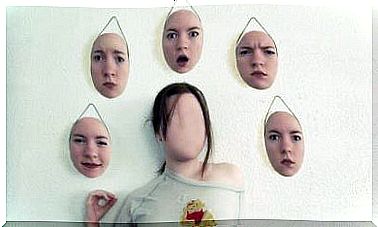Obsessive Personality Disorder

Today’s society, or at least a good part of it, makes us value and reinforce behavior styles that promote dedication to work and highly productive results. Qualities such as perfectionism, meticulousness, organization and competence are highly valued in the work environment, and people who possess them tend to advance and take positions of responsibility in their work.
Therefore, individuals with obsessive personality disorder are often very representative of these characteristics. They spend their working capacity, they like to do things not only well, but in the best possible way. They are not very fond of leisure insofar as in their thought patterns, rest and diversion mean a waste of productive time, of progress.
Characteristics of obsessive people
People with obsessive personality disorder tend to measure satisfaction with their behavior based on their patterns and values before examining the outcome of doing this. They can be the anti-pollution ecologist, the anti-noise neighbor, the driver who respects and enforces the traffic rules… These people rarely give free rein to their instincts or their immediate reactions. Therefore, most of the answers they give are the product of a process of deep reflection. They do not appreciate the risks and plan, organize, classify and place what is within their reach.

They keep a large number of objects which, although often useless, respond to the following thought: “who knows if one day I will not need them”. They can devote much less time to family, interpersonal or social relationships in general. However, they usually take care that the basic needs of their loved ones are covered and that they do not have to worry about it.
The obsessive-compulsive personality style: the perfectionist type
The difference between Perfectionist Personality Style and Obsessive Personality Disorder is the severity of the symptoms that characterize them. People with obsessive personality disorder are so fastidious that they become ineffective both professionally and personally.
When this perfectionism interferes with the daily life of the subject, we can speak of obsessive personality disorder. In addition, a perfectionist personality style is even appreciated by Western societies. Let us not lose sight of the fact that, in these societies, priority is given to values such as individuality, competence and professional advancement.
More common in developed societies
The obsessive personality style seems to be more present in developed societies, like ours, characterized by an organized and disciplined life. People who are trying to gain a prominent place in society are favored by characteristics such as efficiency, punctuality, perseverance, hard work and thoroughness.
Spending many hours in the office to complete a job or to try to eliminate the slightest mistake in a task pays off in the workplace. Many of these people can become senior managers. It is therefore generally considered that, at the enterprise level, the more an employee works the more beneficial it is for the enterprise.

Obsessive personality disorder and self-discipline
People with an obsessive personality exhibit great self-discipline (a powerful “super me” if we look at them from a psychoanalytic point of view). They are ruled by the intellect and not by the emotions. In addition, they are generally reserved and not very demonstrative.
They are prone to stress when their behavior approaches Type A behavior, which makes it difficult to relax and enjoy the pleasures. Having free time without planned activities can make them more nervous than a schedule full of open questions.
Obsessive personality disorder and couple
When it comes to the life of a couple, these people are generally good companions, being faithful, responsible and taking good care of their spouses. Even so, they do it in an unromantic way and show little emotion. They are fundamentally practical.
Because of this emotional reserve, they generally make a good couple with people of the histrionic type (the more effusive and exaggerated of the personality types). Obsessive people are drawn to histrionics as a spouse because the latter make them feel more active and alive. The histrionic can be attracted to the obsessional because the latter gives him the necessary stability.
Obsessive personalities also work well with anti-social, avoidant, addictive, and self-destructive styles. On the other hand, they do not seem to have good relations with subjects having the same type of personality. Nor with narcissistic, paranoid or sadistic styles.

How to interact with an obsessive?
When we need to interact with people with obsessive personality disorder, Oldham and Morris (1995) suggest certain behaviors to make the relationship more fluid. They recommend facing the relationship with good humor and tolerance, allowing the obsessional to continue with his habits. Let us be flexible, let him act as he does, as long as this way of acting does not end up generating a feeling of unease, by turning against him.
Don’t expect the obsessional to change. Given his reluctance to novelty, another person will have to propose the changes. In addition, the few signs of affection that these people express can discourage others. It must be taken into account that this is only a lack of manifestation, that it does not in any way mean the absence of feelings or feelings less intense than those that the person who externalizes them may have.
Power struggles are not effective with people with obsessive personality disorder because they are very adept at justifying their behaviors. It is recommended to listen to them and try to understand them. On the other hand, in a relationship, the obsessional will tend to take care of the details of life together and to be a point of balance for the stability of the relationship. They should be reminded every now and then that they are very important people to those around them.
As we have seen, obsessive personality disorder is characterized mainly by perfectionism, excessive dedication to work, rigidity and inability to get rid of unnecessary objects. The relationship with this type of people can become complicated if the points we have discussed are not taken into account.
Bibliographical references
Feist, J. (2007). Personality theories Madrid: Mc Graw – Hill.
Schultz, D. (2002). Personality theories. Madrid: Auditorium.









